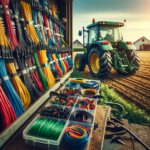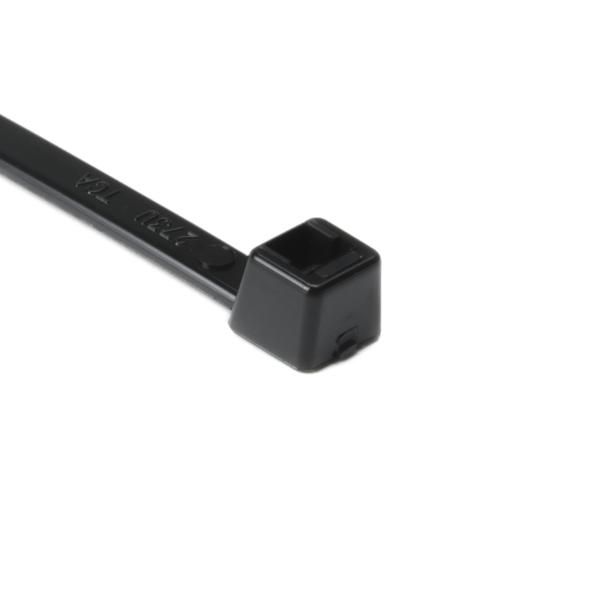Cable ties play a pivotal role in the agricultural sector, especially when it comes to equipment maintenance. These small yet robust tools ensure a high level of organization and safety, which is crucial in harsh agricultural environments. In this article, we delve into the world of cable ties for agricultural equipment, focusing on their durability and versatility.
Cable ties are more than just fastening materials; they are the unsung heroes in the maintenance and efficiency of agricultural machinery. Their resistance to extreme weather conditions, chemicals, and physical stress makes them indispensable. This blog explores various aspects of these vital components, including types, uses, and selection criteria, tailored specifically for agricultural equipment.
The Significance of Cable Ties in Agriculture
In the realm of agriculture, cable ties are not merely accessories; they are necessities. They secure wiring and hoses on tractors, combine harvesters, and other heavy machinery, preventing potential damage and hazards. The reliability of cable ties directly impacts the performance and safety of equipment, emphasizing their critical role.
Moreover, these ties withstand various challenges, such as exposure to sunlight, moisture, and chemicals, commonly found in agricultural settings. This resilience ensures the longevity of both the ties and the equipment they support. As a result, choosing the right cable ties is not just about convenience; it's about ensuring ongoing efficiency and safety in agricultural operations.
Types of Cable Ties for Agricultural Equipment
When selecting cable ties for agricultural equipment, understanding the different types available is essential. Standard nylon ties are popular due to their strength and affordability. However, for more demanding conditions, specialized ties like UV-resistant or heat-stabilized options are more suitable.
There are also stainless steel cable ties, which offer superior strength and resistance to corrosion, making them ideal for outdoor agricultural applications. These ties cater to a range of needs, from basic bundling to securing heavy components under extreme conditions. Thus, it's important to choose the type that best suits the specific requirements of your agricultural machinery.
Factors to Consider When Choosing Cable Ties
Selecting the right cable ties for agricultural equipment involves several considerations. First, assess the environmental conditions. Ties exposed to sunlight and varying temperatures require UV resistance and thermal stability. Next, consider the mechanical demands. Heavy machinery needs ties that can withstand vibration and physical stress without breaking.
Additionally, the material of the cable tie is crucial. Nylon ties offer flexibility, while stainless steel provides unmatched strength. It's also important to consider the size and tensile strength of the tie, ensuring it can comfortably secure the intended load. By weighing these factors, you can select cable ties that will reliably serve their purpose in the demanding world of agriculture.
Dos and Don'ts of Using Cable Ties in Agricultural Equipment
Dos
- Do Choose the Right Material: Select cable ties that suit your environmental needs. Nylon is great for general use, while stainless steel is ideal for harsher conditions.
- Do Consider UV Resistance: For outdoor applications, use UV-resistant cable ties to prevent degradation from sunlight.
- Do Opt for the Correct Size: Ensure the cable tie is large enough to handle the job without being overly tight or loose.
- Do Check for Chemical Resistance: In environments where chemicals are prevalent, choose cable ties that can withstand such exposure.
- Do Regularly Inspect Ties: Periodically check your cable ties for signs of wear and tear, and replace them as needed to maintain safety and efficiency.
Don'ts
- Don't Over-Tighten: Avoid overtightening cable ties, as this can damage wires or hoses and reduce the lifespan of the tie.
- Don't Use the Wrong Type for Heavy Loads: For heavy-duty applications, don’t use standard nylon ties; opt for stronger materials like stainless steel.
- Don't Ignore Temperature Factors: Avoid using standard nylon ties in environments with extreme temperatures; use heat-stabilized ties instead.
- Don't Reuse Cable Ties: Cable ties are designed for single use. Reusing them can compromise their integrity and reliability.
- Don't Neglect Proper Storage: Store cable ties in a cool, dry place to prevent premature aging and ensure they retain their properties when needed.
Product Reviews and Comparisons
HellermannTyton T50I0UVC2 UV Resistant Cable Tie
Review: The HellermannTyton T50I0UVC2 is a robust choice for outdoor agricultural or industrial settings. Its UV resistance, granted by the PA66UV material, ensures longevity even under prolonged sun exposure.
The 50lb tensile strength is sufficient for most medium-duty applications, and the inside serrations provide a secure grip. The operating temperature range of -40°F to +185°F (-40°C to +85°C) covers most environmental conditions, making it versatile.
Pros:
- Excellent UV resistance.
- Strong tensile strength.
- Wide operating temperature range.
- Easy installation.
Cons:
- Limited to indoor and medium-duty applications.
- Only available in black, which may not suit all aesthetic requirements.
Panduit 12" 50lb Light Blue Pan-Ty® Metal Detectable Nylon Cable Ties
Review: Panduit's metal detectable cable ties are an innovative solution for environments where contamination risks are a concern, like food processing. The light blue color and metal impregnation allow for easy detection.
These ties have a similar tensile strength to the HellermannTyton model, but their unique selling point is their detectability. The operating temperature range is similar, making them versatile.
Pros:
- Metal detectable for safety in sensitive environments.
- Consistent performance with a one-piece locking wedge.
- Wide operating temperature range.
Cons:
- Higher price point.
- No UV resistance.
- Lack of UL certification may limit use in certain industries.
Comparison
Both products offer a 50lb tensile strength and a wide operating temperature range, making them suitable for various environments. The HellermannTyton cable tie stands out for its UV resistance and UL certification, making it a more versatile choice for outdoor use.
In contrast, the Panduit cable tie is specialized for environments where metal detectability is crucial, like in the food industry. The choice between the two would depend on the specific requirements of the application, whether it's for general outdoor use or for specialized environments where contamination control is critical.
Conclusion
Cable ties are indispensable in the agricultural sector, offering a blend of durability and versatility in challenging environments. From securing wiring on tractors to resisting harsh weather conditions, these ties ensure the smooth operation of agricultural equipment. Remember to consider the type, environmental resistance, and material when choosing the right cable ties for your agricultural machinery.



